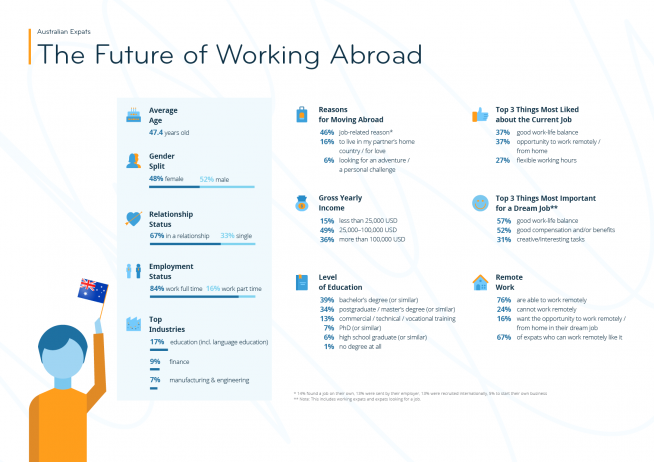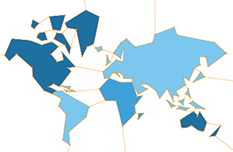Australian Expats Dream of Creative and Flexible Jobs
Why do Australians move abroad? According to the Expat Insider 2021 survey by InterNations, 46% of Australians working abroad name their career as the most important reason for relocating overseas. Most of them found a job on their own (14%), were recruited internationally, or sent by their employer (13% each). Another 5% moved abroad to start their own business, which is more than twice the global average among expats working abroad (2%). Aside from work-related reasons, an above-average share of Australians working abroad (16%) originally relocated because they wanted to live in their partner’s home country / for love (vs. 10% globally).
The Typical Australian Working Abroad
On average, Australian expats working abroad are 47.4 years old, which is significantly older than the global average among working expats (43.1 years). The gender ratio is split more or less evenly between male (52%) and female (48%) expats, and Australians working overseas are more likely to be in a committed relationship than the global average (67% vs. 61% globally). The majority works full time (84%) and spends an average of 40.6 hours per week at work.
Most Australians working abroad have a job in the field of education (17%), followed by finance (9%) and manufacturing & engineering (7%). About three in ten (29%) work in a senior/specialist position, with another 14% being top managers / executives.
Interestingly, 13% say that their highest academic or professional qualifications come from commercial/technical/vocational training, which is more than twice the global average (6%). Close to two in five (39%) have a bachelor’s degree (vs. 33% globally), while just 34% hold a master’s or other kind of postgraduate degree (vs. 47% globally).
A Good Work-Life Balance Is Everything for Australian Expats
When asked what would be most important for them in an ideal work environment, Australians most frequently mention a good work-life balance (57%). Globally, the most-cited aspect is a good compensation and/or good benefits (54%), while just 49% of working expats choose a good work-life balance. For Australian expats, a good compensation and/or good benefits is only the second most important aspect of their dream job (52%).
Luckily, most of them already seem to have a good work-life balance, as this is the aspect that Australian expats enjoy the most about their current job (37%). Close to seven in ten (68%) rate their work-life balance positively.
However, just 23% of Australian expats cite a good compensation and/or good benefits among the aspects they like most about their current job. This is interesting as Australians are among the better-paid expats around the globe: 36% have a gross yearly income of 100,000 USD or more — globally, just 23% make as much.
Remote Work — Nice to Have but Not Necessary
A good work-life balance is on par with the opportunity to work remotely / from home, which is another aspect 37% of Australian expats appreciate about their current job. More than three-quarters of Australian expats (76%) are able to work remotely, and 67% actually enjoy doing so. Exactly two in five (40%) work fully remotely, and 23% work remotely for more than 15 days per month.
The COVID-19 pandemic has only had a minor impact on the remote work policies for Australian expats: just 13% say that remote work was newly introduced by their employer and is here to stay, compared to 20% globally. However, 31% are now able to work remotely more often than in pre-pandemic times (vs. 28% globally).
In an ideal work environment, remote work is not that important for Australians working overseas, though: just 16% find this aspect especially important when imagining their dream job, compared to 22% of expats globally.
The Australian Dream Job Is Creative, Flexible, and Reflects Their Values
Aside from a good work-life balance and a good compensation and/or good benefits, 31% of Australian expats say that creative/interesting tasks are especially important for their dream job (vs. 29% globally). This factor is followed by flexible working hours (30% vs. 28% globally) and corporate culture/values (20% vs. 15% globally). All three aspects, but especially the latter, are more important to Australian expats than to the global average.
Unfortunately, these aspects of their ideal work environment are not yet reflected in their current career: while 27% of Australian expats say they enjoy the flexible working hours in their current job, just 21% single out creative/interesting tasks. And just about one in ten (11%) name the corporate culture/values among the aspects they like best about their current job.
“The values that are important to Australian expats are closely related to the concept of New Work, which describes the new way of working in the global and digital age,” says InterNations Founder and Co-CEO Malte Zeeck. “As they do not seem to find these aspects in their current career abroad, it will be interesting to see how this will impact their professional future. If Australian expats cannot find those kinds of job in their current host countries, they might choose different destinations or simply move back home.”
Australians Are Unlikely to Find Their Dream Job in Their Current Host Countries
In fact, 33% of Australians working overseas say that New Work is less important in the business culture of their host country than in Australia. Globally, just 23% say this about their current country of residence.
This is no surprise when looking at the most common destinations where Australians working abroad live: this list includes Germany, the USA, the UK, China, as well as Japan and Singapore.
When these — and 49 other countries — are compared according to how important New Work is in the local business culture, only the USA (1st out of 55) ranks ahead of Australia (7th). In fact, close to three-quarters of the expats working in Australia (74%) think that New Work plays an important role in the business culture of their host country. Globally, just 58% of working expats would say the same about their current country of residence.
While Singapore (14th) and the UK (15th) at least make it into the top 20 worldwide, Germany only comes in 35th place. China (46th), however, lands in the bottom 10, and Japan is voted the worst out of 55 destinations when it comes to the importance of New Work. In fact, 40% of expats in Japan say that New Work is not important in the country’s business culture, compared to 18% globally.




